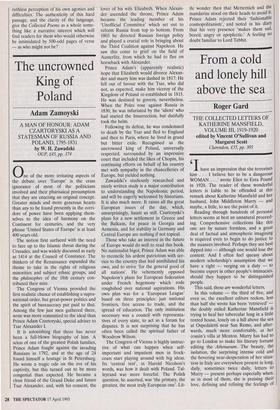The uncrowned King of Poland
Adam Zamoyski
A MAN OF HONOUR: ADAM CZARTORYSKI AS A STATESMAN OF RUSSIA AND POLAND, 1795-1831 by W. H. Zawadzki OUP, f45, pp. 374 One of the more irritating aspects of the debate over 'Europe' is the crass ignorance of most of the politicians involved and their pharisaical presumption that they are enacting an original concept. Greater minds and more generous hearts than any to be found presently in the corri- dors of power have been applying them- selves to the idea of harmony on the Continent for centuries, and the very phrase 'United States of Europe' is at least 400 years old.
The notion first surfaced with the need to face up to the Islamic threat during the Crusades, and was widely discussed as early as 1414 at the Council of Constance. The thinkers of the Renaissance expanded the theme to take in the rights of religious minorities and subject ethnic groups, and the philosophes of the 18th century con- tributed their mite.
The Congress of Vienna provided the first realistic chance of establishing a supra- national order, but great-power politics and the spirit of bureaucracy put paid to that. Among the few just men gathered there, none was more committed to the ideal than Prince Adam Czartoryski, special adviser to Tsar Alexander I.
It is astonishing that there has never been a full-blown biography of him. A scion of one of the greatest Polish families, Prince Adam fought against the invading Russians in 1792, and at the age of 24 found himself a hostage in St Petersburg. He wrote a tragic ode on the eve of his captivity, but this turned out to be more congenial than expected. He became a close friend of the Grand Duke and future Tsar Alexander, and, with his consent, the lover of his wife Elizabeth. When Alexan- der ascended the throne, Prince Adam became the leading member of his `Unofficial Committee' which set out to reform Russia from top to bottom. From 1803 he directed Russian foreign policy and played a crucial role in bringing about the Third Coalition against Napoleon. He saw this come to grief on the field of Austerlitz, from which he had to flee on horseback with Alexander.
Prince Adam's (apparently realistic) hope that Elizabeth would divorce Alexan- der and marry him was dashed in 1817. He fell out of favour with the Tsar, who did not, as expected, make him viceroy of the Kingdom of Poland re-established in 1815. He was destined to govern, nevertheless When the Poles rose against Russia in 1830, he was infuriated by the 'idiots' who had started the Insurrection, but dutifully took the helm.
Following its defeat, he was condemned to death by the Tsar and fled to England and then to Paris, where he lived in grand but bitter exile. Recognised as the uncrowned king of Poland, universally respected, surrounded by an impressive court that included the likes of Chopin, his continuing efforts on behalf of his country met with sympathy in the chancelleries of Europe, but yielded nothing.
Zawadzki's studiously researched and nicely written study is a major contribution to understanding the Napoleonic period, and will be eagerly welcomed by historians. It is also much more. It raises all the great European issues of the day, which, unsurprisingly, haunt us still. Czartoryski's plans for a new settlement in Greece and the Balkans, for peace in Georgia and Armenia, and for stability in Germany and Central Europe are nothing if not topical.
Those who take an interest in the future of Europe would do well to read this book. No nationalist bigot, Prince Adam was able to reconcile his ardent patriotism with ser- vice to the country that had annihilated his own, and to strive 'for the general good of all nations'. He vehemently opposed Napoleon's plans for European federation under French hegemony which rode roughshod over national aspirations. His own plan was for a 'European League' based on three principles: just national frontiers, free access to trade, and the spread of education. The only institution necessary was a council with representa- tives of every state, to act as a forum for disputes. It is not surprising that he has often been called the spiritual father of Woodrow Wilson.
The Congress of Vienna is highly instruc- tive of what can happen when self- important and impatient men in frock- coats start playing around with big ideas. Its 'central test', in Harold Nicolson's words, was how it dealt with Poland. Tal- leyrand was more forceful. The Polish question, he asserted, was 'the primary, the greatest, the most truly European one'. Lit- tle wonder then that Metternich and the mandarins stood on their heads to avoid it. Prince Adam rejected their 'fashionable cosmopolitanism', and noted in his diary that his very presence 'makes them sad, bored, angry or apoplectic.' A feeling no doubt familiar to Lord Tebbit.


















































 Previous page
Previous page